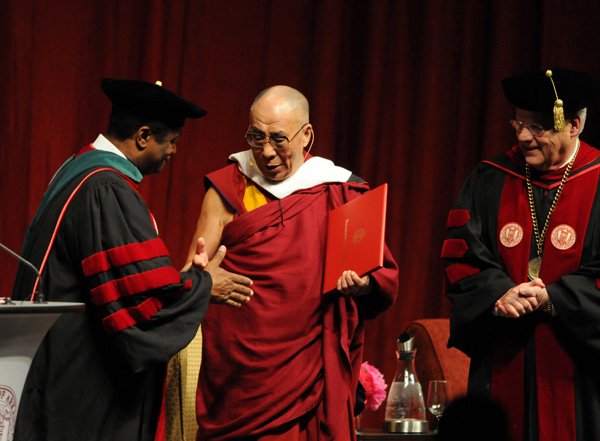FAYETTEVILLE — The crowd rose in a wave Wednesday as pilgrims glimpsed the iconic figure they’d come to see. There was no applause, no murmur of voices, just reverent silence throughout Bud Walton Arena.
His Holiness, the 14th Dalai Lama, grinned and bowed as he noted the show of respect. Visits such as the one to the University of Arkansas give him “some kind of inspiration,” he said as he began his afternoon address at the sold-out event. Now 76 years old, he’s dedicated his life to the well-being of others, he added, but he still appreciates acknowledgment of his work.
As for the legendary magical powers of Tibet, “that’s nonsense,” he said. As for considering him a “god king” or a living Buddha, “also nonsense.”
Neither, he said, is he a genius, even though he’s received scores of awards, among them the Nobel Peace Prize in 1989 and an honorary doctorate of humane letters conferred by the University of Arkansas on Wednesday.
He may be the spiritual leader of the Tibetan people, but His Holiness the Dalai Lama considers himself a simple Buddhist monk and beyond that, “simply a human being,” he said.
The Dalai Lama spoke at the university as part of its Distinguished Lecture Series, but Chancellor David Gearhart gave credit for the visit to Sidney Burris, director of the honors program in the Fulbright College of Arts and Sciences. Burris has been a frequent visitor to the nine refugee camps around Drepung Loseling Monastery in southern India, the only places exiled Tibetans can call home. Burris started inviting the Dalai Lama to the University of Arkansas in 2007.
For Burris, the presence of the Dalai Lama on campus was the dream of a lifetime but also an opportunity to plead for support of the Tutors for Tibetans project he supports. Additional teachers, classrooms and school supplies help the children of the refugee campus learn to both respect their past and embrace their future, he said.
Although the Dalai Lama’s keynote address was titled “Nonviolence in the New Century: The Way Forward,” he spoke in simple terms about achieving the happiness he believes is a human birthright.
First, he said, find satisfaction that doesn’t depend on external influences. “The ultimate source of happiness is within ourselves.”
Second, nourish faith in a greater power, even if that is simply the power of the human spirit.
Third, nurture children and plant in them the seeds of peace.
Fourth, hate the action but never the human behind it. “Thinking of that person in the image of God helps to reduce fear and irritation.”
Finally, he said, people must put aside the concepts of “we” and “they.” “The entire world must be ‘we.’”
Along the way, the Dalai Lama laughed often and veered into stories about steering his mother by her ears when he was a child on her shoulders, learning to drive a car when his driver wasn’t watching and how much he appreciates the informal American style that let him speak freely.
Even though he has stepped down as political leader of the Tibetan people — the first time in four centuries the religious and political roles have been separated — the Dalai Lama will continue his commitment to peace and human values, he concluded.
“The Buddhist philosophy is deeply rooted in Tibet,” he said. “Whether I’m there or not, the Tibetan spirit will remain.”

